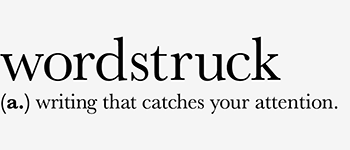I thought you might enjoy this blog post from a fellow copywriter, Tom Albrighton. He strikes a case for pushing words to their limits. Condensing ideas and thoughts down into a memorable or striking phrase.
That very much resonates with my own thinking, that often short and simple is better. Because it’s easy to take in. Easy to understand. Memorable.
And that often invoves using the language of poetry. Poetry is about the economy of language. The right word in the right place. A word or two that perfectly capture a moment or sensation. It’s powerful stuff.
And it’s hard to do. When I run writing workshops in the company I work for, I often hear people say “But our products are really complicated, it’s hard to make them sound simple and fully explain what they do.”
And yet, over the last few weeks, on television screens across the country, thousands of us have tuned in to hear Professor Brian Cox explain the infinite complexities and mysteries of the universe.
He talks about things we cannot see. Describes things so big we cannot measure them and talks about events that will not happen in our lifetime or a million lifetimes. And there’s nothing overly complicated about the language he uses. The programme lasts an hour, but it’s not a lecture that bombards us with information, statistics and mathematical proof points.
So how does he do it? Explain something as complex and marvellous as the universe?
Quite simply by framing it in terms that we can understand. By bringing it back to tangible objects that we can hold, touch or imagine. In one programme, he explained the second law of thermodynamics and ultimately why time only goes forward, using a sandcastle in a desert. Turning something abstract, into something real.
So if Brian Cox can explain entropy in simple language, I’m quite sure businesses can explain their products using it too.
That’s where real world metaphors, like Brian’s sandcastle can help. To give you an example, I was recently trying to get my head around a feature in one of our software products, desperately trying to figure out why it’s useful for a customer.
It’s about data (something intangible). To help me understand it, the product manager used the metaphor of a car. We build the basis of a car, but then our customers can choose the options they want – for example a bigger engine, different wheels, leather seats etc.
It’s basically about shaping data into something that makes sense for our customers, for example, a list of their 20 most profitable products. It means they can adapt the data to suit them, but we’ve given them a head start by providing the basis (the chassis if you like).
I did smile at the fact that Tom’s blog post about writing better, not writing more is in itself over 1,000 words long – something he acknowledges. And now I’ve added my own sum of words to that.
Could I have worked harder to condense it down into a pithy quote? Arguably. But I’m still stewing the ideas in my own version of brain soup.
Tom’s thoughts have also been challenged by another copywriter, Ben Locker, who argues the case for the audience saying it’s just as important to know who you’re writing for, what they want and how it’s being delivered.
I believe that too. And it’s certainly given me plenty to think about for my next writing assignment.

For some reason I can never remember what Prof Cox has said – he is far too distracting! In fact, I keep having to go back to YouTube to check out what he did say! :o) I do remember the sandcastles and entropy – actually, remembering ‘entropy’ is a miracle in itself for me! He is a genius with words and someone to admire by all of us I think. He certainly has his audience in mind. I also work in IT and very often resort to analogies – cars are a favourite, as are plates of food and, bizarrely, dual carriageways (don’t ask!). Great blog – thanks for making me smile.
Thanks Sue. I’m intruiged by how you use dual carriageways as an analogy, and impressed by anyone who can make IT make sense. I’ll soon be seeing Prof Cox live at an event he’s doing in Newcastle. I’m more fascinated by the science, than the person, but he does have a fantastic way with words and his enthusiasm for his subject beams through.
A great article, I always try to start with the audience and work backwards rather than the other way round.